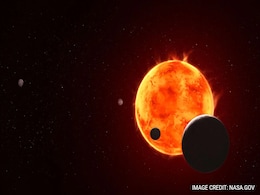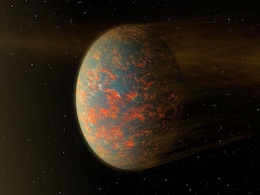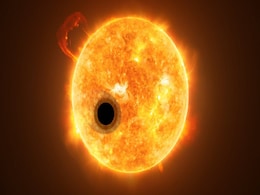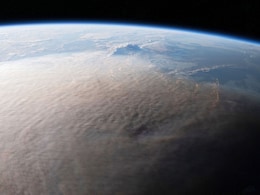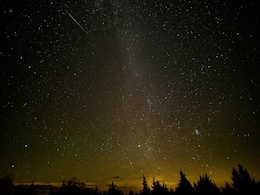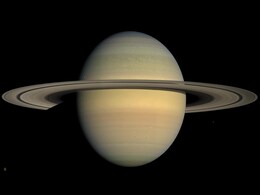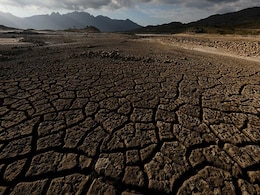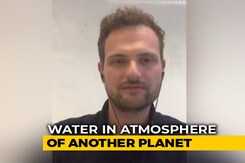Earth Like Atmosphere Planet
- All
- News
- Videos
-

TRAPPIST-1e Methane Signal Likely False, Webb Data Suggests Airless Planet
- Thursday December 11, 2025
The TRAPPIST-1 planetary system, located about 39 light-years from Earth, hosts seven rocky worlds orbiting a cool red dwarf star. While several of these Earth-sized planets lie in the star’s habitable zone, new observations from the James Webb Space Telescope suggest their atmospheres may be too thin to support life. Earlier hints of methane aro...
-
 www.gadgets360.com
www.gadgets360.com
-

Not Like Venus Or Mars, Distant Exoplanet May Have Atmosphere Like Earth's
- Friday September 19, 2025
- World News |
A distant exoplanet might have an atmosphere similar to Earth's, early observations from the James Webb Space Telescope (JWST) suggest. It is part of a group of planets orbiting a star called TRAPPIST-1, about 40 light-years away from Earth.
-
 www.ndtv.com
www.ndtv.com
-

NASA Missions Uncover a Diverse Galaxy of Super-Earths, Raising New Questions About Planetary Evolution
- Thursday August 14, 2025
Super-Earths are among the most common planets in the galaxy, yet none exist in our solar system. Larger than Earth but smaller than Neptune, they range from ocean-covered worlds to scorched, atmosphere-less rocks. Some orbit within habitable zones, making them prime candidates for life. NASA’s Kepler and TESS missions, along with upcoming telesc...
-
 www.gadgets360.com
www.gadgets360.com
-

Oceans Were Once Green, Could Change Colour Again: Study
- Thursday April 10, 2025
- World News | The Conversation
Nearly three fourths of Earth is covered by oceans, making the planet look like a pale blue dot from space. But Japanese researchers have made a compelling case that Earth's oceans were once green, in a study published in Nature.
-
 www.ndtv.com
www.ndtv.com
-

Study Finds Venus Likely Never Had Oceans, Challenging Past Theories
- Thursday December 5, 2024
Recent research published in Nature Astronomy challenges past ideas about Venus, suggesting it never had oceans or conditions for life. Analysis of the planet's volcanic gases and atmospheric composition revealed that Venus’s interior is dry, ruling out the presence of liquid water. This conclusion highlights the stark contrast between Venus and ...
-
 www.gadgets360.com
www.gadgets360.com
-

Scientists Discover New Electric Field in Earth’s Atmosphere Crucial for Life
- Thursday November 14, 2024
Scientists have finally detected the long-predicted ambipolar electric field in Earth's atmosphere. Though weak, it plays a crucial role in shaping the planet’s upper atmosphere, impacting the polar wind and potentially contributing to Earth’s habitability. This discovery could help explain why Earth’s atmosphere has remained conducive to lif...
-
 www.gadgets360.com
www.gadgets360.com
-

Scientists Study Shrinking Mini-Neptunes to Understand Planetary Evolution
- Friday August 5, 2022
- Edited by Gadgets 360 Newsdesk
Scientists at Caltech have discovered four exoplanets — TOI 560b, TOI 1430.01, TOI 1683.01, and TOI 2076b – that appear to be shrinking in size and losing their atmosphere gradually. The rate at which this change is taking place suggests that these celestial bodies, called mini-Neptunes, will eventually lose their atmosphere completely to becom...
-
 www.gadgets360.com
www.gadgets360.com
-

Tonga Eruption: Excess Water Vapour Blasted Into Atmosphere Could Warm Up the Planet for Years, Study Says
- Wednesday August 3, 2022
- Edited by Gadgets 360 Newsdesk
The Tonga-Hunga Ha’apai underwater volcano that erupted in the South Pacific in January injected 1,60,900 tonnes of additional water vapour into the stratosphere, according to researchers. The excess water vapour could heat up the planet for several years, a new study reveals.
-
 www.gadgets360.com
www.gadgets360.com
-

Non-Earth Like Planets Could Host Life for Billions of Years, Study Suggests
- Tuesday June 28, 2022
- Edited by Gadgets 360 Newsdesk
While scientists have looked for water bodies similar to that on Earth, a study suggests that liquid water could exist on the surface of exoplanets for billions of years under other circumstances as well.
-
 www.gadgets360.com
www.gadgets360.com
-

Comet SW3's Spectacular Meteor Shower Tau Herculids May Take Place Next Week: How to Watch It and Other Details
- Friday May 27, 2022
- Edited by Gadgets 360 Newsdesk
Skygazers have an opportunity to see a new meteor shower, which will likely take place in the coming week. Named the Tau Herculids, this minor shower is set to fall from the shattered SW3 comet beginning May 30. The “shooting stars” event is set to peak on May 31. It will be seen across the US and parts of Canada.
-
 www.gadgets360.com
www.gadgets360.com
-

NASA Says Data From Cassini Probe May Help Explain Saturn's Atmospheric Mystery
- Tuesday April 7, 2020
- ANI
The upper layers in the atmospheres of gas giants -- Saturn, Jupiter, Uranus, and Neptune -- are hot, just like Earth's. But unlike Earth, the Sun is too far from these outer planets to account for the high temperatures. Their heat source has been one of the great mysteries of planetary science.
-
 www.gadgets360.com
www.gadgets360.com
-

We're Living Through Earth's Second-Hottest Year, Says US Agency
- Wednesday November 20, 2019
- Science | Andrew Freedman, The Washington Post
This year is increasingly likely to be the planet's second- or third-warmest calendar year on record since modern temperature data collection began in 1880, according to data released this week by the National Oceanic and Atmospheric Administration.
-
 www.ndtv.com
www.ndtv.com
-

Radiation Blasts Stripped Life on Most Earth-Like Planets: Study
- Wednesday November 18, 2015
- Indo-Asian News Service
Large coronal mass ejections have the potential to strip away any atmosphere that a close-in planet like Kepler-438b might have.
-
 www.gadgets360.com
www.gadgets360.com
-

Scientists Crack Mystery of Mars' Missing Atmosphere
- Friday November 6, 2015
- World News | Reuters
Scientists have documented a solar storm blasting away Mars' atmosphere, an important clue in a long-standing mystery of how a planet that was once like Earth turned into a cold, dry desert, research published on Thursday shows.
-
 www.ndtv.com
www.ndtv.com
-
India, US preparing satellites to probe Martian atmosphere
- Tuesday October 29, 2013
- India News | Reuters
Two new science satellites are being prepared to join a fleet of robotic Mars probes to help determine why the planet most like Earth in the solar system ended up so different.
-
 www.ndtv.com
www.ndtv.com
-

TRAPPIST-1e Methane Signal Likely False, Webb Data Suggests Airless Planet
- Thursday December 11, 2025
The TRAPPIST-1 planetary system, located about 39 light-years from Earth, hosts seven rocky worlds orbiting a cool red dwarf star. While several of these Earth-sized planets lie in the star’s habitable zone, new observations from the James Webb Space Telescope suggest their atmospheres may be too thin to support life. Earlier hints of methane aro...
-
 www.gadgets360.com
www.gadgets360.com
-

Not Like Venus Or Mars, Distant Exoplanet May Have Atmosphere Like Earth's
- Friday September 19, 2025
- World News |
A distant exoplanet might have an atmosphere similar to Earth's, early observations from the James Webb Space Telescope (JWST) suggest. It is part of a group of planets orbiting a star called TRAPPIST-1, about 40 light-years away from Earth.
-
 www.ndtv.com
www.ndtv.com
-

NASA Missions Uncover a Diverse Galaxy of Super-Earths, Raising New Questions About Planetary Evolution
- Thursday August 14, 2025
Super-Earths are among the most common planets in the galaxy, yet none exist in our solar system. Larger than Earth but smaller than Neptune, they range from ocean-covered worlds to scorched, atmosphere-less rocks. Some orbit within habitable zones, making them prime candidates for life. NASA’s Kepler and TESS missions, along with upcoming telesc...
-
 www.gadgets360.com
www.gadgets360.com
-

Oceans Were Once Green, Could Change Colour Again: Study
- Thursday April 10, 2025
- World News | The Conversation
Nearly three fourths of Earth is covered by oceans, making the planet look like a pale blue dot from space. But Japanese researchers have made a compelling case that Earth's oceans were once green, in a study published in Nature.
-
 www.ndtv.com
www.ndtv.com
-

Study Finds Venus Likely Never Had Oceans, Challenging Past Theories
- Thursday December 5, 2024
Recent research published in Nature Astronomy challenges past ideas about Venus, suggesting it never had oceans or conditions for life. Analysis of the planet's volcanic gases and atmospheric composition revealed that Venus’s interior is dry, ruling out the presence of liquid water. This conclusion highlights the stark contrast between Venus and ...
-
 www.gadgets360.com
www.gadgets360.com
-

Scientists Discover New Electric Field in Earth’s Atmosphere Crucial for Life
- Thursday November 14, 2024
Scientists have finally detected the long-predicted ambipolar electric field in Earth's atmosphere. Though weak, it plays a crucial role in shaping the planet’s upper atmosphere, impacting the polar wind and potentially contributing to Earth’s habitability. This discovery could help explain why Earth’s atmosphere has remained conducive to lif...
-
 www.gadgets360.com
www.gadgets360.com
-

Scientists Study Shrinking Mini-Neptunes to Understand Planetary Evolution
- Friday August 5, 2022
- Edited by Gadgets 360 Newsdesk
Scientists at Caltech have discovered four exoplanets — TOI 560b, TOI 1430.01, TOI 1683.01, and TOI 2076b – that appear to be shrinking in size and losing their atmosphere gradually. The rate at which this change is taking place suggests that these celestial bodies, called mini-Neptunes, will eventually lose their atmosphere completely to becom...
-
 www.gadgets360.com
www.gadgets360.com
-

Tonga Eruption: Excess Water Vapour Blasted Into Atmosphere Could Warm Up the Planet for Years, Study Says
- Wednesday August 3, 2022
- Edited by Gadgets 360 Newsdesk
The Tonga-Hunga Ha’apai underwater volcano that erupted in the South Pacific in January injected 1,60,900 tonnes of additional water vapour into the stratosphere, according to researchers. The excess water vapour could heat up the planet for several years, a new study reveals.
-
 www.gadgets360.com
www.gadgets360.com
-

Non-Earth Like Planets Could Host Life for Billions of Years, Study Suggests
- Tuesday June 28, 2022
- Edited by Gadgets 360 Newsdesk
While scientists have looked for water bodies similar to that on Earth, a study suggests that liquid water could exist on the surface of exoplanets for billions of years under other circumstances as well.
-
 www.gadgets360.com
www.gadgets360.com
-

Comet SW3's Spectacular Meteor Shower Tau Herculids May Take Place Next Week: How to Watch It and Other Details
- Friday May 27, 2022
- Edited by Gadgets 360 Newsdesk
Skygazers have an opportunity to see a new meteor shower, which will likely take place in the coming week. Named the Tau Herculids, this minor shower is set to fall from the shattered SW3 comet beginning May 30. The “shooting stars” event is set to peak on May 31. It will be seen across the US and parts of Canada.
-
 www.gadgets360.com
www.gadgets360.com
-

NASA Says Data From Cassini Probe May Help Explain Saturn's Atmospheric Mystery
- Tuesday April 7, 2020
- ANI
The upper layers in the atmospheres of gas giants -- Saturn, Jupiter, Uranus, and Neptune -- are hot, just like Earth's. But unlike Earth, the Sun is too far from these outer planets to account for the high temperatures. Their heat source has been one of the great mysteries of planetary science.
-
 www.gadgets360.com
www.gadgets360.com
-

We're Living Through Earth's Second-Hottest Year, Says US Agency
- Wednesday November 20, 2019
- Science | Andrew Freedman, The Washington Post
This year is increasingly likely to be the planet's second- or third-warmest calendar year on record since modern temperature data collection began in 1880, according to data released this week by the National Oceanic and Atmospheric Administration.
-
 www.ndtv.com
www.ndtv.com
-

Radiation Blasts Stripped Life on Most Earth-Like Planets: Study
- Wednesday November 18, 2015
- Indo-Asian News Service
Large coronal mass ejections have the potential to strip away any atmosphere that a close-in planet like Kepler-438b might have.
-
 www.gadgets360.com
www.gadgets360.com
-

Scientists Crack Mystery of Mars' Missing Atmosphere
- Friday November 6, 2015
- World News | Reuters
Scientists have documented a solar storm blasting away Mars' atmosphere, an important clue in a long-standing mystery of how a planet that was once like Earth turned into a cold, dry desert, research published on Thursday shows.
-
 www.ndtv.com
www.ndtv.com
-
India, US preparing satellites to probe Martian atmosphere
- Tuesday October 29, 2013
- India News | Reuters
Two new science satellites are being prepared to join a fleet of robotic Mars probes to help determine why the planet most like Earth in the solar system ended up so different.
-
 www.ndtv.com
www.ndtv.com


